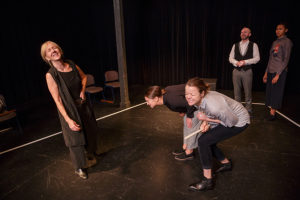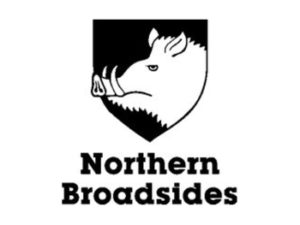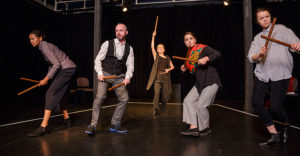A look back at the final rehearsals of Richard III from AFTLS actress, Hannah Barrie
Since everyone was complaining of sore sides due to the amount of laughing that went on, we knew we had a “good’un.”
We all love spoonerisms, I won’t hear otherwise, and they arrived constantly in the Richard III rehearsal room. One of the reasons for a large amount of corpsing.
Derby instead of asking “What of his heart perceive you in his face?” at the council meeting in Act III asked “What of his f….?” You get the picture.
 We’ve had furry dragons instead of fiery dragons from Liz.
We’ve had furry dragons instead of fiery dragons from Liz.
And “tyranny for trifle” from Evvy (which made everyone think of a good blancmange).
“My horse I’ll help you to a Lord,” Catesby proclaimed in Act V.
But my favourite was from Paul as Elizabeth in Act IV, “Who has any cause to moon but I?”
And if you don’t like a good spoonerism (shame on you!), please consider Alice as Richmond proudly riding a flatulent horse during a rousing speech.
Perhaps you needed to be there, but I had to lie on the floor on more than one occasion due to laughing so much. It was a very enjoyable rehearsal process. But we didn’t just say silly things and roll ’round the floor. Our rehearsal weeks were epic. We managed to get to the end of the play with dance, music, drumming, and everyone off book.
Now this line learning business was no mean feat. It was hard. For everyone I think. Not only is the word count huge for all, there’s no one through line — one character journey that you’re creating and exploring — there are six. Unusual? Too right. And then you throw in music, rhythmic scene changes, props, etc. and the brain starts to over heat a little.
 My final week in rehearsals was dedicated to mapping out my journey for each character throughout the play and the journey for Hannah the actor; exits, entrances, etc. It’s been a complicated dance, and I’m happy to finally feel confident in knowing what I’m doing from moment to moment.
My final week in rehearsals was dedicated to mapping out my journey for each character throughout the play and the journey for Hannah the actor; exits, entrances, etc. It’s been a complicated dance, and I’m happy to finally feel confident in knowing what I’m doing from moment to moment.
 But enough about me. Let’s talk about Conrad Nelson. For any of you who are familiar with the company Northern Broadsides you’ll know the name. This company, based in the north of England (Halifax) produce Shakespeare and other works usually in the northern accent and tour the country with these vibrant shows. Their work is down to earth, accessible, musical, dynamic, and I’m a big fan. Conrad directs, acts, and composes music for them. And we were fortunate to be able to get a session with him which turned out to be far more than the music session it was briefed to be. The tricky thing with the show is how to create drama, tension, a threat, dynamic fast moving scene changes where the energy doesn’t drop, how to create atmosphere out of nowt [nothing]. So we decided that rhythm and song would be our best bet. Conrad came to us with some excellent suggestions. A song to potentially use in the Act I, scene II funeral procession, a ‘Te Deum’ that Con composed himself for the end moment with Richmond after Richard has been killed, and a song to start proceedings with a bang. He’s also a keen Morris dancer and taught us a set dance. I’m a keen Irish dancer, so I’ve used my own knowledge, this dance as inspiration, and my cast mate’s fabulous ideas to choreograph a folky number for the start. I hope you like it. We do. And finally Conrad taught us some rhythm patterns using 5, 4, and 3 that are simple but create great drama and tension. What an inspirational day. Thanks Con!
But enough about me. Let’s talk about Conrad Nelson. For any of you who are familiar with the company Northern Broadsides you’ll know the name. This company, based in the north of England (Halifax) produce Shakespeare and other works usually in the northern accent and tour the country with these vibrant shows. Their work is down to earth, accessible, musical, dynamic, and I’m a big fan. Conrad directs, acts, and composes music for them. And we were fortunate to be able to get a session with him which turned out to be far more than the music session it was briefed to be. The tricky thing with the show is how to create drama, tension, a threat, dynamic fast moving scene changes where the energy doesn’t drop, how to create atmosphere out of nowt [nothing]. So we decided that rhythm and song would be our best bet. Conrad came to us with some excellent suggestions. A song to potentially use in the Act I, scene II funeral procession, a ‘Te Deum’ that Con composed himself for the end moment with Richmond after Richard has been killed, and a song to start proceedings with a bang. He’s also a keen Morris dancer and taught us a set dance. I’m a keen Irish dancer, so I’ve used my own knowledge, this dance as inspiration, and my cast mate’s fabulous ideas to choreograph a folky number for the start. I hope you like it. We do. And finally Conrad taught us some rhythm patterns using 5, 4, and 3 that are simple but create great drama and tension. What an inspirational day. Thanks Con!
Now the challenge with this rhythm business is that everything we use has to fit in the suitcase. So sticks are our thing! The cajon was thrown out of the window, luckily the window was open at the time so no damage done. Although we loved the sounds it made and were really excited about the rhythms we were creating we decided it was too cumbersome for our little suitcase, so it had to go. Sorry cajon fans. BUT, we have sticks!  Quite few of them, as it happens, and they’re great for sustaining the rhythms (and therefore atmosphere) we feel are so important to our production. There’s such a gathering of momentum throughout the play, as first of all Richard’s plots escalate, and then as the rebellion led by Richmond builds to its bloody climax on Bosworth Field. Most companies tackling the play would have large casts, elaborate sets, effects and costumes to create this – so we have had to be extremely imaginative! We’ve found that the sticks make a great sound and can also represent various different objects (knives, swords, etc) so they fit in perfectly with our lo-tech aesthetic/constraint.
Quite few of them, as it happens, and they’re great for sustaining the rhythms (and therefore atmosphere) we feel are so important to our production. There’s such a gathering of momentum throughout the play, as first of all Richard’s plots escalate, and then as the rebellion led by Richmond builds to its bloody climax on Bosworth Field. Most companies tackling the play would have large casts, elaborate sets, effects and costumes to create this – so we have had to be extremely imaginative! We’ve found that the sticks make a great sound and can also represent various different objects (knives, swords, etc) so they fit in perfectly with our lo-tech aesthetic/constraint.
One of the exciting challenges is making whole worlds out of almost nothing and the freedom that eventually gives you (plus the lack of tech time when you’re on tour). It’s the essence and beauty of ‘poor theatre’ which then allows there to be almost no divide between the performers and audience, which is a relationship which suits Shakespeare well (soliloquies, asides, etc).
We’ve experimented with different stick options. First of all we used some old broom handles (in fact, many of the items we’ve used in rehearsals have emerged from Liz’s attic) and then moved on to dowel rods. Once we settled on dowels, we then experimented with different lengths and how practical and aurally pleasing they were. We also had to consider the suitcase, so they certainly couldn’t be very long. After much deliberation we’ve settled on varying sizes of sticks. And as I type this, they’re safely nestled in our large blue suitcase surrounded by the costumes and props we’ve decided upon. But there lies another story for another time…
— Hannah Barrie (from September’s London rehearsals)
